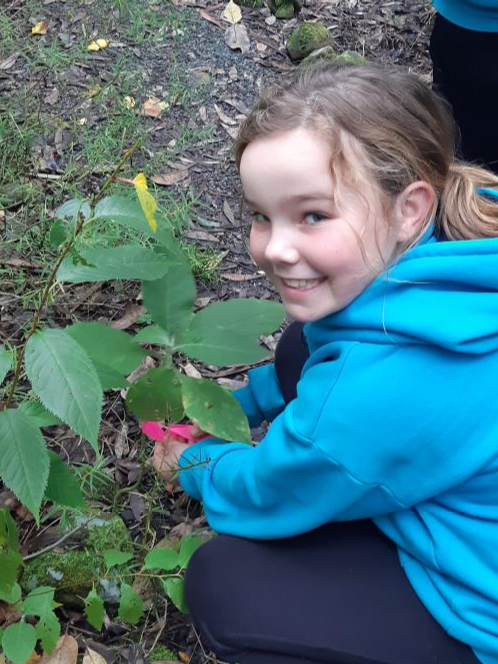Story
Passions entwine at Hurupaki School
Enthusiastic weed warriors from Hurupaki School have led to the discovery of a large infestation of the highly invasive pest plant, batwing passionflower.
Passions entwined when super sleuths from the school’s DIP (Dive into Passions) group found a single batwing passionflower seedling while foraging for weeds in the school’s wetland area.
Their discovery helped the Northland Regional Council find mature vines and heaps of seedlings hidden in the outer reaches of the school grounds.
“It was really exciting,” said one of the 12 members of the DIP group, which is supported by the popular Enviroschools programme. “We were out in the wetlands putting pink ribbons on all the pest plants in the area when we saw this funny looking little plant we hadn’t seen before. I’ve seen the batman logo and I thought its leaves looked like a batwing.”
 A Hurupaki School weed warrior attaches a pink ribbon to a pest plant.
A Hurupaki School weed warrior attaches a pink ribbon to a pest plant.
With the help of their Enviroschools facilitator Eden Hakaraia, the explorers took photos and sent them through to Vivienne Lepper, the regional council’s biosecurity officer for pest plants.
Vivienne picks up the story. “I confirmed that it was batwing and went out there to search the area,” she says. “Unfortunately, it was school holidays, so the children weren’t there for this part of the hunt.
“I spent hours out there searching and found plenty of seedlings, so I knew there had to be an elusive mature vine somewhere nearby. After some time searching around the school I saw huge vines smothering the native tree tops – there were about eight adult plants in just one little piece of bush.”
A drone, saws and various other tools were used to find and remove the vines completely and ready them for safe and careful disposal.
Batwing passionflower is an eradication plant, which means it’s still possible to stop its spread in the region. The plant has limited distribution within Northland but it’s a rampant grower that can grow from seedling to mature vine in six months, and it’s easily spread by birds.
“The plant is known to be in Kerikeri and Kamo, but this is a new site,” Vivienne says. “We’ll have to survey for new plants around the school and start inspecting local properties. We’ll need to keep doing this once every four months for some years.”
This is where the Hurupaki School students come into the frame, Eden says. “Now that they recognise the plant, they are perfectly placed to watch out for the batwing passionflower and let us know if they see any. The children are out and about in this environment, so they can really help us in the battle to stop this vigorous threat to our native tree canopy.
Eden says she and regional council staff will spread the word about the vine and encourage interested students to become ambassadors and enlist the help of their whanau and wider community to keep an eye out for the pest plant.
School principal Rob Posthumus says the school’s proximity to Pukenui Forest makes the task even more important because of the heightened risk.
“I have a real philosophy about our children being engaged with the world to make it a better place,” she said. “This is part of their role as kaitiaki of the school’s wetlands area.
“I applaud the regional council’s support for our Enviroschools programme because it’s really valuable and becomes more important for the world environment every day.”
If anyone does see batwing passionflower, please report it to the Biosecurity Team at Northland Regional Council’s biosecurity team on 0800 002 004.
